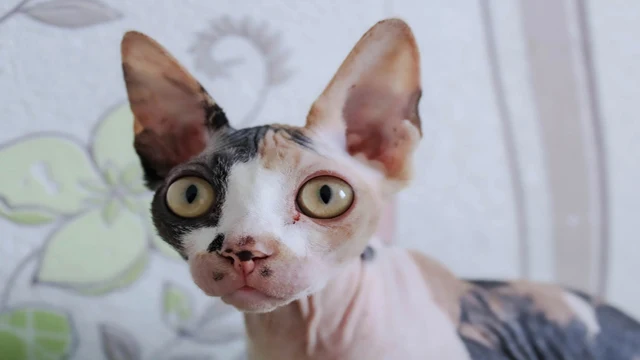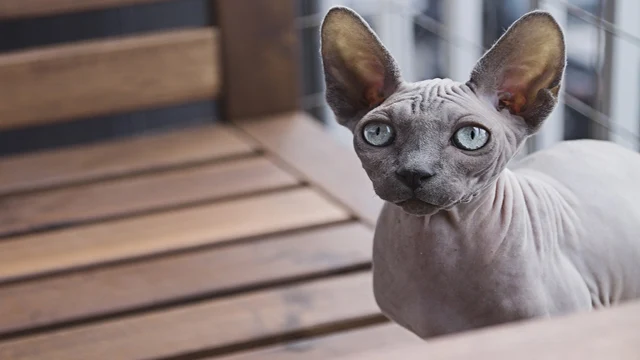The Sphynx cat is a breed known for its lack of coat (fur). Cats with no hairs are a naturally occurring genetic variation.
The breeding program began in 1966 in Ontario, Canada when a domestic cat gave birth to a hairless male kitten.
Sphynx cats born today are descended of their hairless kittens found in Toronto in 1978.
Description: Sphynx cats
Sphynx cat’s main feature is its lack of a fur coat. These cats are not entirely hairless but covered with fine downy hair that is like a peach skin. This cat has no whiskers or eyelashes.
The eyes of these cats are deep-set and the shape of a lemon. The body of this cat is muscular with a barrel chest.
Sphynx cats have long and slender legs and have a bow-legged appearance caused by the barrel chest. The tail is long and tapering and hard to the touch. They are warm and soft to touch.
The skin of this cat is wrinkled on head, body and legs but are taut on other parts of body. Pigmentation is visible on the skin of the Sphynx cat.
- Coat Length: Extra-short.
- Age Expectancy: 8-14 yrs.
- Weight range: Male: Medium: < 12 lbs, Female: Medium: < 12 lbs.
Personality
The Sphynx cat is friendly, playful and loves attention. These cats often greet their owners when they come home. They are highly intelligent and cuddly.
They like to sleep with their owners – under the covers. Their body temperature is a degree or two above the average for normal cats and they have voracious appetites to compensate for the heat loss.
These cats don’t like cold, they like warm places.
Feeding & Grooming
Feeding: Every cat is unique and each has their particular likes, dislikes, and needs when it comes to food.
Cats are carnivores and every cat must obtain 41 different nutrients from their food. Proper nutrients will vary depending on age and overall health, so energetic kitten needs a different balance of nutrients in her diet than a less active senior cat.
Grooming:The skin needs to be bathed or sponged every week to remove its oily secretions.
These cats’ skin oily secretions must also be cleaned from the outer ear regularly to prevent ear infections.
Sphynx Cats: Care and Well-being
When it comes to feline uniqueness, Sphynx Cats take center stage. Known for their lack of fur and striking features, these cats have captured the hearts of cat enthusiasts around the world.
Skin Care
Due to their lack of fur, Sphynx Cats require special attention to their skin. Regular bathing is necessary to remove oil buildup and keep their skin healthy. Additionally, they may need protection from the sun, as their exposed skin is more susceptible to sunburn.
Dietary Needs
Sphynx Cats have a higher metabolism than other breeds, requiring a nutrient-rich diet. Consult with your veterinarian to ensure you're providing the right balance of nutrients to support their unique dietary needs.
Environmental Considerations
Because of their lack of fur, Sphynx Cats are more sensitive to temperature changes. Ensure they have access to warm areas and cozy blankets, especially during colder months.
Regular Vet Check-ups
Routine veterinary check-ups are crucial for Sphynx Cats to monitor their overall health and address any potential issues promptly. Their unique physiology may require specialized care, so partnering with a knowledgeable vet is essential.
Fun Facts About Sphynx Cats
Warmth Seekers
Sphynx Cats are known to seek warmth actively. They often gravitate towards sunny spots in the house or curl up under blankets to stay cozy.
Not Truly Hypoallergenic
While some people with cat allergies may find Sphynx Cats more tolerable, they are not completely hypoallergenic. Allergies can still be triggered by proteins in their saliva and skin.
Social Butterflies
Sphynx Cats thrive on social interaction. They enjoy being around people and other pets, making them an excellent choice for families and individuals alike.
Sphynx Cats FAQs
Do Sphynx Cats have any specific health concerns?
While generally healthy, Sphynx Cats may be prone to skin issues. Regular vet check-ups can help address any potential concerns early on.
Are Sphynx Cats high-maintenance in terms of grooming?
Despite being hairless, Sphynx Cats require regular bathing to maintain their skin health. Their ears also need cleaning to prevent wax buildup.
Are Sphynx Cats suitable for families with children?
Sphynx Cats are known for their social nature and can be great companions for families with children. However, supervision is recommended to ensure gentle interactions.
Can Sphynx Cats go outside?
Due to their lack of fur, Sphynx Cats are more susceptible to sunburn and temperature extremes. It's safer to keep them indoors or provide a well-supervised outdoor environment.
What is the lifespan of a Sphynx Cat?
Sphynx Cats typically have a lifespan of 12 to 15 years, with proper care and attention.
Do Sphynx Cats get cold easily?
Yes, Sphynx Cats can get cold quickly due to their lack of fur. It's essential to provide them with warm environments and cozy spots to cuddle.
Conclusion
In the world of feline companionship, Sphynx Cats bring a unique charm that goes beyond their hairless exterior. Their friendly disposition, distinctive appearance, and warm nature make them a delightful addition to any home. By understanding their needs and providing proper care, you can enjoy the rewarding experience of having a Sphynx Cat as your devoted companion.
So, whether you're a seasoned cat enthusiast or considering your first feline friend, embrace the extraordinary world of Sphynx Cats. Their captivating personalities and one-of-a-kind appearance are sure to bring joy and warmth to your home.



